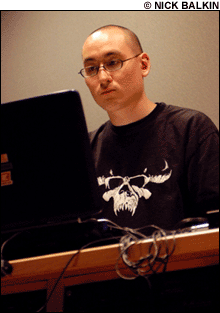 It’s Friday night at the Berklee College of Music, and students are filing into room F12 to be pummeled with sonic shrapnel. Their instructor this week has been RICHARD DEVINE, perhaps the most complex avant-garde digital composer of our time. As an expert in Surround Sound technology and sound design, Devine was invited by the music-synthesis department to share his knowledge via demonstrations, lectures, and hands-on training. And after his week-long residency, he’s getting the opportunity to let it all loose. “I’ve been listening to this guy for a while and hearing all the crazy shit he’s been doing and it’s definitely influenced me,” says Matt Lange, a junior and music-synthesis major. “So seeing his outlook on how he does everything, what tools he uses, his compositional processes — I just wanted to get into the mind of Richard Devine a little.”
It’s Friday night at the Berklee College of Music, and students are filing into room F12 to be pummeled with sonic shrapnel. Their instructor this week has been RICHARD DEVINE, perhaps the most complex avant-garde digital composer of our time. As an expert in Surround Sound technology and sound design, Devine was invited by the music-synthesis department to share his knowledge via demonstrations, lectures, and hands-on training. And after his week-long residency, he’s getting the opportunity to let it all loose. “I’ve been listening to this guy for a while and hearing all the crazy shit he’s been doing and it’s definitely influenced me,” says Matt Lange, a junior and music-synthesis major. “So seeing his outlook on how he does everything, what tools he uses, his compositional processes — I just wanted to get into the mind of Richard Devine a little.”
Devine’s mind is a dark, chaotic place. His music, for labels from Florida’s Schematic to Warp in the UK, is hardly music at all but intensely dense sound sculpture. “The music that I do lends itself more to art, like an art-gallery type of setting, so I was shocked when they invited me out,” he says while plugging in the tiny machines he uses to create his sonic onslaught. The audience filtering in seems drawn from the stranger kids on campus: a lot of dreadlocks, a lot of hoodies and scraped knees. “But obviously there are new kids coming up listening to newer forms of music and trying to listen to cutting-edge — I don’t know what you want to call it — experimental electronic music. I came to the school with no knowledge of what it was going to be like, I don’t know if anyone knew who I really was, but I was pretty shocked.”
Devine was brought in to speak on everything he knows about the music industry, from contracts to MIDI programming to high-end Surround Sound technology. “There’s a lot of technology at the college,” says Berklee music-synthesis chair KURT BIEDERWOLF. “But our major is all about original sound design and being creative with it, and Richard is a perfect example of that.” Devine adds, “It’s perfect for the students because what I’m doing are all hot topics and areas they could make a career into. I’m a good example of someone who’s, kind of, made it? I guess?”
Devine performs live in Surround, using programs he helped develop. It’s not easy listening: he litters the expensive sound system with digital detritus, challenging both the limits of the system and the stamina of the students. At different points, the students can be seen clasping their ears or nodding their heads.
These days, he does less on CD and more for heavy hitters like Native Instruments and Sony, but he made his name on the strength of his avant-garde sound. “I mean, last year I bought my house, and everything I’ve bought, I bought through music. And I didn’t make it the normal way, I didn’t make normal music. As strange as it may have seemed, it got me somewhere.”
For just that reason, he’s the kind of musician you’d associate less with Berklee than with a school like MassArt, up the street, where he’ll headline later that night. But, says Danny Patterson, another Berklee student and Devine fan, that’s part of the point. “At the school sometimes they tell you that it’s much harder to make it, and you have to conform to what people want to really make it, and he hasn’t conformed.”
David Day spins tonight, April 27 with Wayne Marshall and Axel Foley at River Gods
Email the author
David Day: circuits@squar3.com